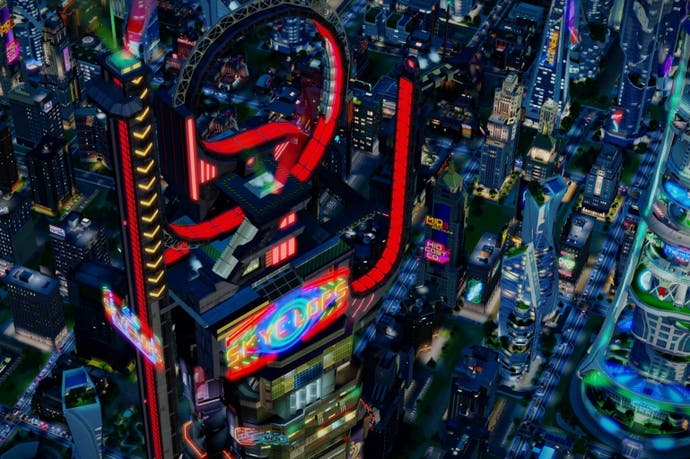SimCity: Cities of Tomorrow review
Shiny happy people.
In the future, we will all live in a daze, stunned by the technology that will surround us. Our homes will be at the top of towers thousands of feet tall, all of them connected by shining bridges that cut through the sky. Automated drones will keep us healthy, keep us tidy, even make sure we obey the law. We will work in buildings that are great sentinels of metal and light. We will be so rapt, so amazed by the omnipresence of progress, that we won't notice that the maglev train has got stuck, that the school bus is circling like a shark, that our friends can't find the shops next door. Then occasionally, just occasionally, something will knock us out of that daze and we'll realise just how silly the future has turned out.
While SimCity collapsed entirely under scrutiny, its first expansion Cities of Tomorrow merely teeters. Though it stumbles as it steps towards the future, it is at least heading in the right direction. Sometimes it makes a fool of itself but, though I'm loathe to admit this, I care less than I should. It's just so beautiful that I want to forgive it all its trespasses. It's a magnificent vision of the future, and the dystopian indignities it sometimes displays almost add to the charm... almost.
Cities of Tomorrow pulls SimCity into a future that lies somewhere between Star Trek and Blade Runner, a glowing fantasy of sleek curves and raging neon. It's a future where technology solves every problem, where bigger is always better and yet where suburban living can still survive, albeit bordered by laser fences.
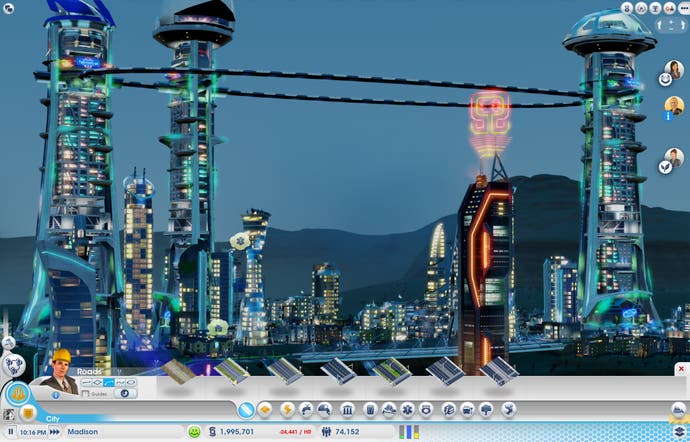
It features two key additions, The Academy and OmegaCo. The former is like a university for environmentalists and in this verdant venue you will plant the seeds for a cleaner, smarter city, researching wave power, fusion reactors and sewage sanitsers. OmegaCo is much more concerned with profit and can turn just about everything in your city into a franchise of some sort, but will also use metal and oil to manufacture drones that can help out your city services. While the two aren't mutually exclusive, they're likely to lead you in one direction or another.
Standing proud in the cities of the future are the MegaTowers, buildings not so dissimilar to the out-of-town arcologies. These shining spires are constructed level by level, each of which can be residential, commercial or a utility of some sort, before being capped with a park, with solar panels or with a giant, gaudy, glowing advert.
These self-contained cities in the sky call SimCity's launch to mind, because it's not always entirely clear what's going on inside them. Residents on one level seem unable to find the shops on the next. Everyone who lives in one particular section of one of these gorgeous giants complains about a sewage problem that nobody else suffers from and which, because I can't find it, I can't do anything to solve.
At least things behave a little more logically back on the ground. SimCity has been patched since March and the sims of the next generation seem to have partly got their act together, though the game still suffers regular hiccups and has a new selection of spasms to add to its collection.
"SimCity was always a handsome game, but Cities of Tomorrow gives it touches of glory... It's an almost psychedelic interpretation of the next century"
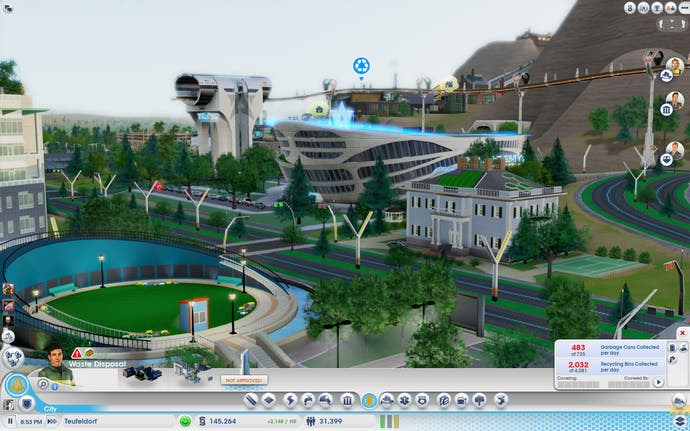
Since putting an Academy-granted booster on my solar power station, my power readouts frequently drop to zero. Thankfully, the lights rarely go out. The maglev trains, also a product of the Academy and running hundreds of feet in the air, have a tendency to stop working. Only a reloading of the city gets them going again. Then there was the meteor strike that took out my garbage dump: I never noticed because, even though no garbage was collected for days, even weeks, nobody complained about the mountains of waste all around them. Yesterday my community college taught 1,058 students, yet it only has space for 500. Perhaps I shouldn't complain.
And I often don't, because I'm constantly distracted. Time and technology beautify your city. Every time you drop one of the new structures, whether a humming Academy annex or a simple hydro station, it transforms everything around it into a futuristic reinvention. Roads glow, cars convert and buildings are mottled with solar panels. The future bleeds out from these buildings, gradually seeping into everything around them and - let me be quite clear about this - it often looks bloody fantastic.
SimCity was always a handsome game, but Cities of Tomorrow gives it touches of glory with some fantastic architecture and an almost psychedelic interpretation of the next century. It sounds wonderful, too, singing a jubilant call to tomorrow with arrays of howling synths and yearning, optimistic melodies.
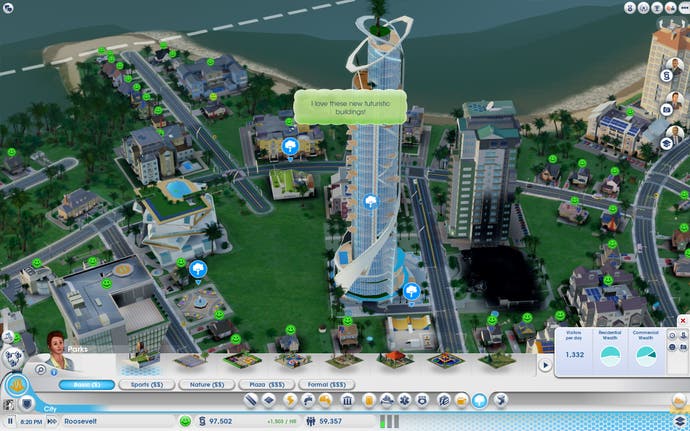
This is how I've lost so much time to it, so very many hours. I can't say I wholly trust or understand Cities of Tomorrow - the game still has too many quirks and tics - but it's a treat for the senses. Sure, it's impossible to try to lay roads or maglev tracks without loudly cursing the placement tool at least once an hour, but birthing beautiful buildings from nothing accompanied by music that has all the energy and vigour of Vangelis is a soporific, almost sedative experience that makes the minutes fall away.
Frustrations come, though, and a bolstered building roster means you'll be even more stretched for space inside your cramped city limits. To get the most out of your Academy, you'll want to build its three annexes, all of which makes for a considerable footprint. Anything researched by the Academy also demands the resource it transmits, something called ControlNet, so you might want a few boosters for that too. The MegaTowers, meanwhile, are almost the size of a stadium.
Nothing is all that big by itself, but Cities of Tomorrow just gives you more without any more space to put it in. Specialising several different cities in a region is no longer a tactic, it's now essential, and building the best new cities is a challenge that requires serious forward planning. If you'd rather start with one of your old cities, you'll likely be tearing its heart, lungs and liver out should you want to drop in anything new.
"The game constantly finds ways to dispel its own charms, blurting irrelevant and incorrect information at you, and it's still too easy"
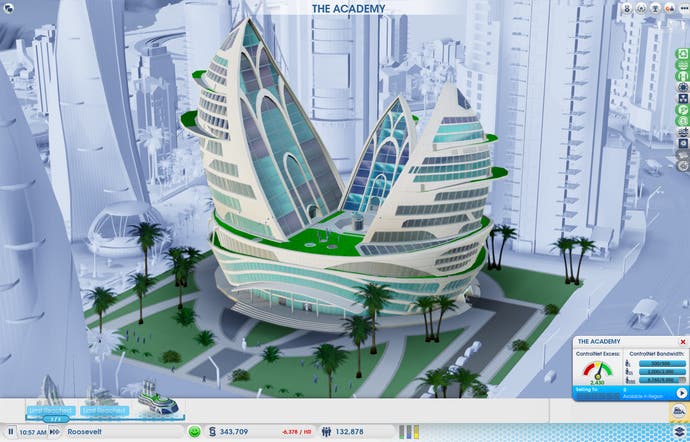
Cities of Tomorrow makes SimCity a better game but, unfortunately, it still doesn't make SimCity a particularly good game. While its presentation is excellent and the act of laying out a city is alarmingly addictive, nurturing and developing that city is less compelling. The game constantly finds ways to dispel its own charms, blurting irrelevant and incorrect information at you, and it's still too easy. Your citizens are too happy with too little and it's still a doddle to make a fortune by simply selling your own recyclables. Much of the new technology in Cities of Tomorrow costs a fortune to develop, which suggests it partly exists just as a currency sponge.
I got along a lot better with Cities of Tomorrow than I did with SimCity. I've watched the finely-sculpted skyscrapers become sundials for the city, while the streets they've stood watch over have filled with robot firefighters and automated garbage vans. But I've also been called away from my mayoral duties by police officers complaining about non-existent crime, by reports of full classrooms from empty schools, by a transport advisor who said my streetcars were lost. Every time I've reached for the future, it's brought me back to the present. Just as I was having fun.
